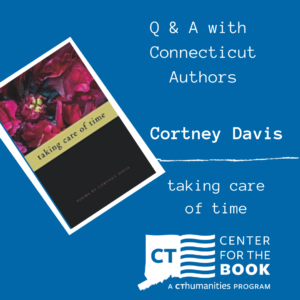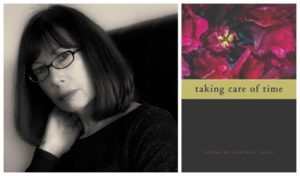Coronavirus has book lovers reading more than ever. Is your coronavirus reading list different from your regular reading list? If yes, how has it changed?
Normally, in pre-pandemic times, I read three books at a time (real books, not on Kindle), usually two novels and one poetry collection. In February, those books were “The Memory Police” by Yoko Ogawa, “Apeirogon” by Colum McCann, and “List & Story,” poems by Hilda Raz. But since being quarantined, I’ve been drawn to a series of novels I might call lighter, but certainly not lesser, the wonderfully entertaining novels by the Canadian author, Louise Penny. There are sixteen books in her series about Inspector Gamache, who quotes poetry and solves murders, and about his family and friends in the village of Three Pines. I’m on book fourteen; book fifteen awaits. Why these mysteries? Because they provide a respite from real life at the same time mimicking the complexities of life; because the characters are fully drawn and reliable, becoming more my familiar friends with every book; because for the hours I’m reading, I can believe that Justice is always served, that neighbors love one another in spite of their individual flaws; and because while I must live in my own uncertain life, marred by serious family illness and this viral threat, I can, for a time, exist in a world that runs alongside mine, an alternate route, comforting and reliable, with surprises and dangers that always, always turn out okay.
Where do you get your inspiration?
For me, as a poet, inspiration strikes when something in my immediate life connects in some mysterious way with an event in the past. Maybe I see a particular color blue on a storefront sign and suddenly remember a blue dress my mother wore, and this connection calls up forgotten feelings, revelations, moments that might mesh perfectly with what’s happening in the world now. Bringing the two together–the past and the present–can create a window into something new. I like poems that are more about real experiences rather than abstract ideas–although if a poem turns out right, the concrete details can also evoke universal ideas, inviting a reader to share in the moment of the poem.
Who made reading important to you?
My parents did, with their shelves lined with books and with the freedom they allowed me to choose any book and read it (I read The Scarlet Letter when I was twelve–bet I missed a lot). I was an only child, raised at a time when youngsters were expected to entertain themselves, and reading was my magic, my escape. My mother loved poetry, and there volumes by Keats and Poe and Wordsworth, all for my reading pleasure with no academic lessons to mar my enjoyment. My father encouraged me to write as well as to read. He’d write a first sentence, then ask me to finish the story, a wonderful way of introducing me to the thrill and validity of imagination.
Where is your favorite place to read?
I’d like to say that I read in an old hammock swaying in my garden, or that I read with a fountain pen in hand, in case of inspiration, in my study where dust motes shimmer in the light and a cat purrs beside me. But mostly I read sitting at a small nondescript table in the corner of our kitchen. Yes, there are pencils and pens in a jar nearby, and usually some snack or meal in front of me as I read. The magic of story and the taste of good food, two comforts.
What did you want to be when you grew up?
I wanted to be an artist who wrote. An art major my first year of college, I soon realized that I loved words and was better at painting with words than with pigments. Along the way life intervened, as it often does. It’s a story too long for this paragraph, but I ended up being a nurse who writes about her patients, her family, her experiences in caregiving; about the mysteries of the body and the life and love the body holds.
Who is the most supportive person in your life when it comes to your writing?
When I was growing up, it was my dad. Then it was my children who tolerated a mother who wrote poems about them and about our lives. My daughter, as a teenager, surprised me by attending one of my poetry readings–the best gift and affirmation. When I first began writing seriously and publishing, I belonged to a wonderful poetry group–we called ourselves The Hat City Scribblers–an amazingly talented bunch whose support was essential. For many years I met monthly with Sondra Zeidenstein, the (now retired) editor of Chicory Blue Press. She helped me stay brave, honest, and personal in my writing. These days, I’m privileged to have the support of the members of three poetry workshops: The Mad Goat Poets; the Bethel Chapter of the CT Poetry Society; and a small as-yet-unnamed three-woman group. In all these workshops, we offer one another something important and necessary–not only support but also good critique and a helpful reality check. Writing is, at first, a solitary endeavor. But it flourishes best when it comes out of the writing room into the light and the company of others.
Bio
Cortney Davis, a Nurse Practitioner, is the author of “Taking Care of Time,” winner of the Wheelbarrow
Poetry Prize from Michigan State University (MSU Press, 2018); of “Leopold’s Maneuvers” (University of
Nebraska Press) winner of the Prairie Schooner Poetry Prize; and of “Details of Flesh” (Calyx Books). Her
non-fiction publications include “When the Nurse Becomes a Patient: A Story in Words and Images” and
“The Heart’s Truth: Essays on the Art of Nursing” (both from Kent State University Press). She is co-editor
of three anthologies, “Between the Heartbeats: Poetry and Prose by Nurses,” and “Intensive Care: More
Poetry and Prose by Nurses” (both from University of Iowa Press); and “Learning to Heal: Reflections on
Nursing School in Poetry and Prose” (Kent State University Press 2018). Her poems have appeared in
journals including Poetry, Hudson Review, Superstition Review, Descant, Sun, Bellevue Literary Review,
Crazyhorse, Poetry East, Sentence, Underground Voices, Rattle, The Antigonish Review, and others. She is
the recipient of an NEA Poetry Fellowship, three CT Commission on the Arts Poetry Grants, an Independent
Publishers’ Silver Medal, a Living Now Gold Medal in Non-Fiction, The CT Center for the Book Award in Non-
Fiction, an Independent Publisher’s Benjamin Franklin Gold Medal in Non-Fiction, and four Books of the
Year awards from the American Journal of Nursing. She was recently selected to be the first poet laureate of Bethel, CT.
Cortney Davis, Poet Laureate of Bethel CT (www.cortneydavis.com)
Purchase via Bookshop.org.









